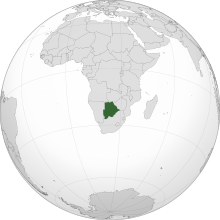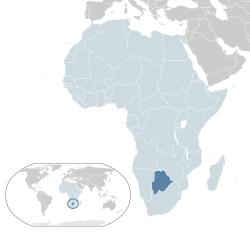
Back Ботсвана Abkhazian Botswana ACE Botswana Afrikaans Botsuana ALS ቦትስዋና Amharic Botswana AMI Botsuana AN Botswana ANG Botsuwana ANN बोत्स्वाना ANP
Republic of Botswana Lefatshe la Botswana (Tswana) | |
|---|---|
| Motto: Pula "Let it Rain" | |
| Anthem: Fatshe leno la rona "Blessed Be This Noble Land" | |
| Capital and largest city | Gaborone 24°39.5′S 25°54.5′E / 24.6583°S 25.9083°E |
| Official languages | English[1] |
| National language | Setswana[1] |
| Ethnic groups (2024[2]) | |
| Religion (2021) |
|
| Demonym(s) |
|
| Government | Unitary parliamentary republic with an executive presidency[4] |
| Duma Boko | |
| Ndaba Gaolathe | |
| Dithapelo Keorapetse | |
| Terence Rannowane | |
| Legislature | Parliament (National Assembly) |
| Independence from the United Kingdom | |
| 31 March 1885 | |
• Governed under High Commissioner for Southern Africa | 9 May 1891 |
• Established (Constitution) | 30 September 1966 |
| Area | |
• Total | 581,730 km2 (224,610 sq mi)[5] (47th) |
• Water (%) | 2.7 |
| Population | |
• 2023 estimate | 2,417,596[6] (145th) |
| 2,359,609[7] | |
• Density | 4.1/km2 (10.6/sq mi) (231st) |
| GDP (PPP) | 2024 estimate |
• Total | |
• Per capita | |
| GDP (nominal) | 2024 estimate |
• Total | |
• Per capita | |
| Gini (2016) | medium inequality |
| HDI (2022) | high (114th) |
| Currency | Pula (BWP) |
| Time zone | UTC+2 (Central Africa Time[14]) |
| Date format | dd/mm/yyyy |
| Drives on | left |
| Calling code | +267 |
| ISO 3166 code | BW |
| Internet TLD | .bw |
Website www | |
| Tswana[2] | |
|---|---|
| Person | Motswana |
| People | Batswana |
| Language | Setswana |
| Country | Botswana |
Botswana,[c] officially the Republic of Botswana,[d] is a landlocked country in Southern Africa. Botswana is topographically flat, with approximately 70 per cent of its territory part of the Kalahari Desert. It is bordered by South Africa to the south and southeast, Namibia to the west and north, Zambia to the north and Zimbabwe to the northeast. With a population of slightly over 2.4 million people and a comparable land area to France, Botswana is one of the most sparsely populated countries in the world. It is essentially the nation-state of the Tswana people, who constitute nearly 80 per cent of the population.
The Tswana ethnic group are descended mainly from Bantu-speaking peoples who migrated into southern Africa, including modern Botswana, in several waves before AD 600. In 1885, the British colonised the area and declared a protectorate named Bechuanaland. As part of the decolonisation of Africa, Bechuanaland became an independent Commonwealth republic under its current name on 30 September 1966. Since then, it has been a parliamentary republic with a consistent record of uninterrupted democratic elections, although the Botswana Democratic Party was the only ruling party from independence until 2024. As of 2024[update], Botswana is the third-least corrupt country in Africa, according to the Corruption Perceptions Index published by Transparency International.
The economy is dominated by mining and tourism. Botswana has a per capita GDP (purchasing power parity) of about $20,158 as of 2024[update]. Botswana is the world's biggest diamond-producing country. Its relatively high gross national income per capita (by some estimates the fourth-largest in Africa) gives the country a relatively high standard of living and the second-highest Human Development Index of continental Sub-Saharan Africa (after South Africa). Despite this, Botswana continues to grapple with high unemployment rates. Botswana is a member of the Southern African Customs Union, the Southern African Development Community, the Commonwealth of Nations and the United Nations.
- ^ a b "About Our Country". Gov.bw. Archived from the original on 22 October 2023. Retrieved 17 April 2022.
Botswana has a number of tribes across the country, collectively known as Batswana. The official language is English and Setswana is the national language, although there are other spoken languages.
- ^ a b c Cite error: The named reference
ciawas invoked but never defined (see the help page). - ^ "Botswana". The World Factbook (2024 ed.). Central Intelligence Agency. 14 September 2022. (Archived 2022 edition.)
- ^ "Botswana". The World Factbook (2024 ed.). Central Intelligence Agency. Retrieved 17 December 2019. (Archived 2019 edition.)
- ^ Global Forest Resources Assessment 2015 – Country Report – Botswana (PDF). fao.org (Report). United Nations Food and Agriculture Organization. 2015. p. 9. Archived (PDF) from the original on 17 March 2023. Retrieved 4 June 2024.
Total Country Area ('000)ha / 58 173
- ^ "Botswana". The World Factbook (2024 ed.). Central Intelligence Agency. Retrieved 24 September 2023.
- ^ "Statistics Botswana - Census 2023 - Population of cities, towns and villages" (PDF). p. 9. Archived (PDF) from the original on 9 October 2022. Retrieved 22 July 2022.
- ^ "Home | 2022 Population and Housing Census Dissemination Conference". www.statsbots.org.bw. Archived from the original on 1 July 2024. Retrieved 1 July 2024.
- ^ "Population Distribution Structure and Density in Botswana" (PDF). Statsbots. 2022. p. 12. Retrieved 1 July 2024.
- ^ a b c d IMF, Botswana Archived 2 June 2024 at the Wayback Machine Retrieved 30 May 2024
- ^ "HDR23-24 Summary (Specifically IHDI)". UNDP. Archived from the original on 21 May 2024. Retrieved 2 May 2024.
- ^ Nations, United. Specific country data (Report). United Nations. Archived from the original on 12 August 2022. Retrieved 1 May 2024.
- ^ "Human Development Report 2023/2024" (PDF). United Nations Development Programme. 13 March 2024. p. 275. Archived (PDF) from the original on 13 March 2024. Retrieved 13 March 2024.
- ^ "Chapter: 01:04 Interpretation Act 1984 (§40(1))". 20 July 1984. Archived from the original on 28 March 2017. Retrieved 11 September 2020.
- ^ "Botswana". Collins English Dictionary. HarperCollins. Archived from the original on 26 July 2019. Retrieved 26 July 2019.
Cite error: There are <ref group=lower-alpha> tags or {{efn}} templates on this page, but the references will not show without a {{reflist|group=lower-alpha}} template or {{notelist}} template (see the help page).



